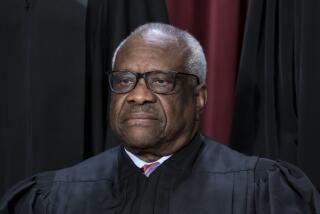NEWS ANALYSIS : Witnesses Offer Panel No Relief From Dilemma
WASHINGTON — As groups of friends and colleagues of both Anita Faye Hill and Clarence Thomas testified before the Senate Judiciary Committee Sunday, they bolstered the credibility of both accuser and accused in the emotion-charged inquiry into sexual harassment allegations against the man President Bush has nominated to the Supreme Court.
But none of the “witnesses” had actually witnessed anything between Hill and Thomas, and in the end they could not categorically resolve what has become the central issue of the sensational case: whether Thomas or Hill is lying.
In the afternoon, four friends of Hill described her as a quiet, honest and level-headed woman who confided to them years ago that she had been sexually harassed by “Clarence,” her supervisor first at the Department of Education and later at the Equal Employment Opportunity Commission. None of them said they knew Thomas, but they said they were certain that Hill was telling the truth.
In the evening, four female friends and co-workers of the former EEOC chairman described him as a supervisor who treated women with respect and dignity. They portrayed Hill as an ambitious, aloof woman who had a crush on Thomas.
And the back-and-forth testimony Sunday created the possibility that the Judiciary Committee might finish its extraordinary hearings where it began--with two starkly contrasting accounts about the relationship between two people, and no clear way to tell which is telling the truth.
If so, members of the Senate could face a true dilemma when it comes time to vote. If they vote to approve Thomas’ nomination, they will have given a lifetime seat on the nation’s highest court to a judge who has had lodged against him strong and unrefuted allegations that he had grossly mistreated a subordinate. Millions of women will see such a vote as one that condones sexual harassment.
Conversely, if they vote to reject Thomas on the basis of lurid and unconfirmed charges by a single woman, it will convince millions of others that Bush’s nominee had indeed been “lynched” by Senate Democrats.
Sunday’s testimony mostly sharpened the conflict between the two sides.
Hill’s friends called her a cheerful person who laughed easily, a Ronald Reagan Republican who was upset by the defeat of Supreme Court nominee Robert H. Bork and a woman whose life was so private that she could not bring herself to discuss sex even with her friends.
Over four hours of testimony, they knocked down the notion fostered by Thomas’ supporters on Saturday that Hill for political or personal reasons might have fabricated the explicitly sexual conversations in a last-minute effort to prevent another conservative from joining the high court.
Judge Susan Hoerchner of Norwalk, Calif., also said that sometime in the 1980s Hill had described a chilling comment. She quoted Hill as attributing to Thomas: “You know, if you had witnesses, you’d have a perfect case against me.”
But Republican Sen. Charles E. Grassley of Iowa stressed that Hill’s friends reported none of the “specifics” that Hill testified to on Friday. They could only confirm that Hill had told them generally of sexual harassment during the 1980s.
And the four women testifying in behalf of Thomas said they considered it “impossible” that their former supervisor could have made grossly sexual comments to a female employee.
J.C. Alvarez, who worked with both Hill and Thomas, described Hill as “a very hard, tough woman” who acted as though she had a special relationship with Thomas. She was not “a meek, innocent, shy Baptist girl from the South,” Alvarez said, in comments intended to cast doubt on the notion that Hill is so weak-willed that she would tolerate years of aggressive harassment by Thomas.
The pro-Thomas witnesses also insisted that in their view, Thomas would not harass any woman.
“Nothing in his behavior would suggest even the remotest possibility that this could be true,” said Nancy Fitch. “I don’t believe a word of it, not one word.”
“I know Clarence Thomas and I know Anita Hill, and I know Clarence Thomas would not say these kind of things,” said Thomas’ long-time secretary Diane Holt.
But she and the other co-workers were quickly forced to concede they could not “know” that he did not make sexual advances to Hill. Democratic Sen. Patrick J. Leahy of Vermont forced each of them to acknowledge that for most of the workday, they did not know what took place behind the closed doors of Thomas’ office.
So it went Sunday, as Republicans and Democrats jockeyed for position during the third day of hearings.
On Friday, the Judiciary Committee members insisted that they were interested only in fact-finding, in revealing the truth--regardless of where it led. But by Sunday, attitudes had obviously hardened along partisan lines.
Republican defenders made clear they believed that Hill, for unknown reasons, had invented her lurid accounts of sexual advances and pornographic movies.
The Democrats seemed just as convinced that Hill was a reluctant witness who, with nothing to gain, came forward to tell a painful tale from her past.
After hearing five days of testimony from Thomas and hearing more than 90 witnesses, the Senate Judiciary Committee split 7-7 on whether to confirm President Bush’s nominee. The final decision would have to be made on the floor the Senate.
The third day of the extraordinary hearings called to seek the truth on Hill’s sensational allegations seemed to have changed no minds, at least among the 14 senators.
More to Read
Get the L.A. Times Politics newsletter
Deeply reported insights into legislation, politics and policy from Sacramento, Washington and beyond. In your inbox three times per week.
You may occasionally receive promotional content from the Los Angeles Times.











